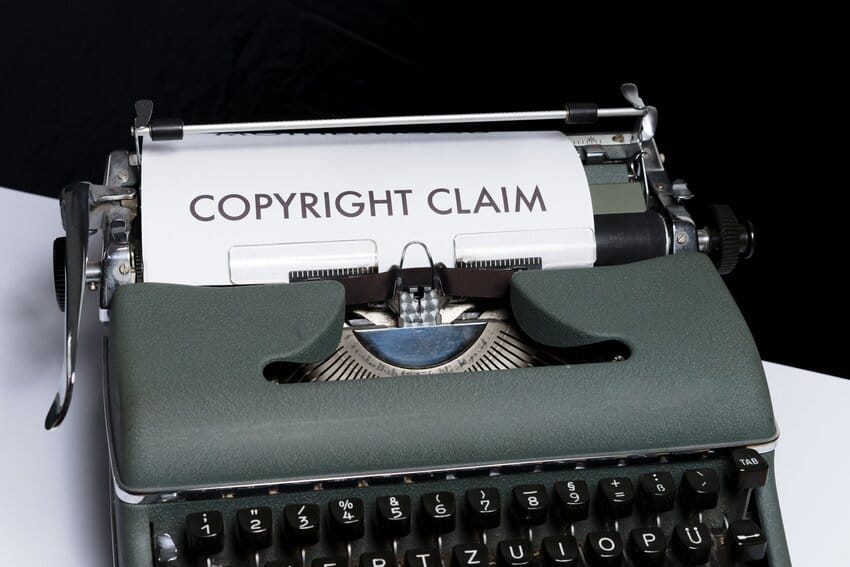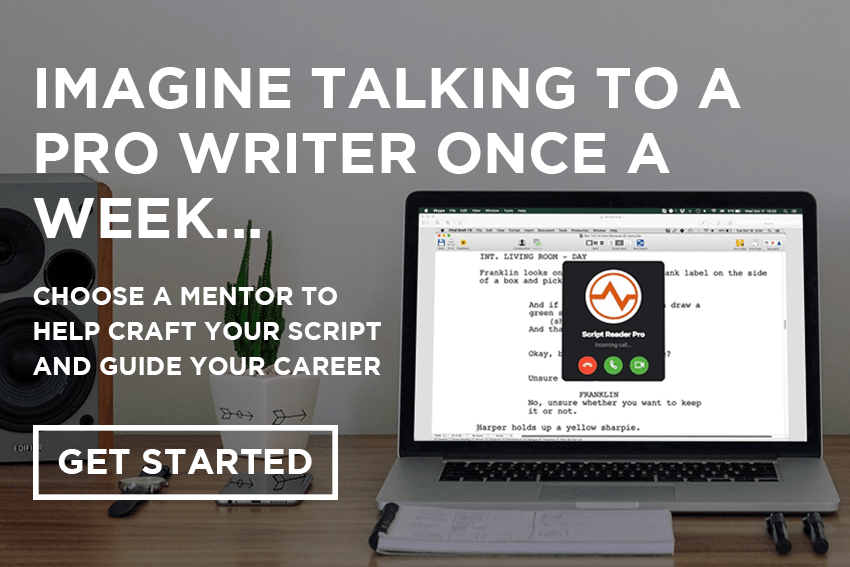
Script Development 101: Option Agreements, Development Deals & More.
Confused about the script development process once a script starts to gain some “heat” from the industry? Baffled by option agreements? Not sure what a spec development deal is?
In this post we cover the essentials every aspiring screenwriter MUST know about the business side of the craft.
This article will break down the entire script development process from beginning to end: a hands-on-guide for surviving (yes, “surviving”) the necessary stage of finalizing a script for packaging and production.
So, let’s dive right on in. (Disclaimer: This post contains affiliate links, meaning if you purchase something via a link we will receive a small commission at no extra cost to you.)
What is script development?
Let’s say you’ve written a great script that’s gained the interest of some industry folk. Congrats—this is a huge achievement.
But…
In order for your script to get produced it has to first go through a little episode known as “script development.”
The script development process broadly encompasses the timeframe between a script being optioned or bought and the start of filming.
The initial 4 possible routes of script development.
When a screenplay goes to market, there are only a few scenarios that can take place, and they all lead the writer down a different path of script development.
Here’s a broad outline of the possible outcomes to expect once the script development process gets started:
• Outright purchase
• Option agreement
• Spec development deal
• Show of interest
Let’s take a look at each in more detail.
#1: Outright purchase.
Back in the day, it was normal for scripts to be purchased outright. However, as the price tags of film productions increased, so too did the financial risk.
Film execs and producers no longer felt it fiscally viable to shell out big money on unproven writers and scripts. Unfortunately, script purchases nowadays are usually reserved for proven writers who have written big-time movies.
But even in this rare case, the purchased writer will still likely face many months of script development ahead—to be done personally or, in some cases, farmed out to an established writer.
The lowdown:
• Contract required? Yes
• Payment upfront? Yes
• Paid for rewrites? Yes
#2: Option agreement.
Secondly, there’s a script “option,” which is basically a contract between you and a producer or film exec. Or even an actor who is a fan of your script and thinks he or she might be able to get it set up with themselves as the lead.
This agreement gives a producer exclusive permission to develop, shop and package your screenplay to acquire the necessary elements to produce your movie (e.g. partner producers, a director, financiers or talent).
Think of it as a small deposit to borrow your script (usually $1 to $2000) before its actual acquisition—that always has an agreed upon timeframe (usually around two years) to protect a writer’s interests.
This is a great scenario. An option agreement shows that the interested producer is serious about your material—that he or she’s willing to put up a little bit of cash for the option and sign their name on the agreement.
While this shows that they’ve got some skin in the game, it could still all lead to nothing. But more on this later.
The lowdown:
• Contract required? Yes
• Payment upfront? Yes, but a nominal amount
• Paid for rewrites? No
#3: Spec development deal.
A director of development’s job is to take pitch meetings and find writers and projects that they can shape in-house from the ground floor.
This may lead to you being offered a “spec development deal.” Essentially, to write an entire spec script from scratch under the watchful eyes of a director of development, creative exec, or both.
Given that it is a “spec” deal, it more often than not means zero upfront money, zero contract and lots of free work on your end in good faith.
All with the understanding that once your script is fully realized to their satisfaction, they’ll potentially pick it up with a contract and it will go onto the company’s packaging slate (i.e. added to a list of movies to be produced).
Consequently, landing a spec development deal is regarded as a coveted (albeit rare) situation. The idea here is that the access to the contacts you’re working with is equal to equity, should they end up passing on the project.
The lowdown:
• Contract required? No
• Payment upfront? No
• Paid for rewrites? No
#4: A show of interest.
A show of interest occurs when an exec likes your script but (and it’s a big “but”) wants you to come up with a “different version” of it, with his or her vision implemented. All before making any kind of commitment to the material.
More often than not this means that, unlike with a spec development deal, the exec won’t expend any “sweat equity” in helping to craft the material in the hopes of their company picking it up.
For this reason, be on your toes. A show of interest is a dark and scary unknown, with no guarantee, no money, and no risk on the producer’s part.
Without the right protection from, say, a manager, it’s not unusual for a writer to be convinced into doing endless rewrites, only for the interested party to lose faith and ghost-out, never to be heard from again.
Or it could lead to an option agreement… As we mentioned before: it’s a dark and scary unknown.
The lowdown:
• Payment upfront? No
• Contract required? No
• Paid for rewrites? No
Script development hot sauce: The option agreement.
As briefly outlined, outright purchases and spec development deals are pretty rare. And a show of interest can be hit or miss.
Therefore, overall, getting a script optioned is your best-case scenario and what you should realistically be aiming for.
So, let’s get into a few nuts and bolts of what getting optioned actually means and entails during the script development process.
Option agreement length.
An option agreement can be set for anywhere between 6 months to 18 months. The typical length of an option is 1 year.
Here’s a typical section describing the length of an option agreement:
2. OPTION PERIOD
The option shall be effective during the period commencing on the date hereof and ending one year later (the “Initial Option Period”). The Initial Option Period may be extended for an additional six months by payment of One Thousand Dollars ($1,000.00) on or before the expiration date specified above (the “Second Option Period”).
Let’s talk money.
As a general rule for starting writers, what you’re paid for a script is solely based on the budget it’ll cost to make it.
A writer is generally paid 2 percent of whatever the budget is (that’s what most reps ask for).
Let’s say you write a $500,000 indie script. You should, as a starting point, ask for 2 percent of the budget (in this case $10,000) as the script purchase price.
And the same 2 percent rule is applied to any amount greater than $500,000.
The WGA has guidelines for signatory producers and/or writers. To find out what the guild minimums are for certain budgets on signatory projects, contact the WGA and inquire.
$1? Really?
Back in the day, the $1 option reigned supreme. Indie producers would try and snap up as many scripts they could for a dollar option.
Which means, you handed over exclusive rights to a producer for a buck, giving them an allotted amount of time to either shop it or sit on it for between twelve to eighteen months.
Often times, these producers would throw them all at a wall, see which ones stuck, and then shelve the rest until the option expired.
But things have changed… Nowadays, any producer worth their salt will pay more than a dollar for an option agreement.
But hold on the new car.
There is no set amount—an option agreement can be $100 or $1000. A $1000 option does happen, and there’s no reason why you shouldn’t expect that. But more common is anywhere in the middle.
A $500 option would be a reasonable, respectable amount up front. Especially considering any option agreement is taking your script off the market for a year or more. There should be a price for that, and any real producer will respect that.
Keep in mind that most upfront option money is usually against the purchase price.
This means if you’ve given $500 for the option, it will be deducted from the amount you’re given once the script is purchased upon financing. This is common and totally reasonable.
Do some more research.
We recommend you do more research on the somewhat tricky area of how to navigate script option agreements by checking out Scott Kirkpatrick’s book, Writing for the Green Light.
In it, he takes an option agreement example, breaks it down line-by-line and explains in detail how they work during the script development process.
Standard option agreements with further details can be found online or at the WGA website but here’s an option agreement sample to give you an idea of what you may be asked to sign.
Here’s what you want to avoid during script development.
You’ve probably heard of the phrase “development hell.” The inordinately drawn-out time spent rewriting a script and trying to gain some traction on it.
This happens when a newbie writer’s script is requested by a producer who is initially interested, but not yet completely sold.
The producer says “with some minor tweaks—not much, just a quick polish” he or she would be happy to take a look at the script again.
Then, after eight months of rewrites according to said producer’s notes and new ideas and an agonizing rewrite of about 75 percent of the script—they decide to pass on it.
Another possibility is is that the producer takes the co-developed material and shops it around town. Upon zero interest from second parties, the producer kindly thanks you for the hard work… and then disappears.
Even worse, true stories abound of writers going through this process back to back with multiple producers with the same script. One right after another.
In a moment, we’ll look at some ways to try and avoid the above, but…
The script development process ALWAYS involves rewrites.
No matter which of the four script development scenarios you find yourself in, you’re always going to be given notes and you’re always going to have to do rewrites.
This is a commonly understood practice in both the indie and the studio world.
Development execs and/or producers will want to sit down with you. In the studio setting, if the writer is already well known, the sit-down will be more of a collaboration of ideas and thoughts.
If you’re a newbie writer, the meeting will be more about them wanting to gauge if you’re someone they can collaborate with further.
You’re golden if they’re not only fans of the script, but also you as the writer.
In their minds, they want to know that you’re not just a great writer, but someone they can work with. And they’ll soon learn this once they’ve given you the first set of script notes.
The simple truth is, they’re interested in your script because they believe it can be packaged and marketed. They see it as a great business opportunity. It’s not necessarily about you, the writer.
Even though you wrote the original script, you still have to prove that you are the right writer to rewrite it according to their thoughts and vision. And prove that you can do it in a skilled and timely manner.
Notes from execs are a necessary evil—part of the job—and there is no escaping them. But there are ways to navigate the experience so that you don’t lose your sanity along the way.
Script development survival guide step #1: Don’t be a rewrite pushover.
No one will fault you for drawing a rewrite-line in the sand. You’ll always know your own limit and should always protect yourself from exuberant rewriting requests.
There should usually only be three rounds of rewrites during the script development process.
Round #1.
Upon being asked to do rewrites, a writer will usually have four to six weeks—sometimes less—depending on need. This is enough time to discuss notes, map out solutions and execute changes.
Round #2.
The second round (or 2nd development draft) will follow discussions of what was improved on the first round, and what can still be made better. This usually takes about the same amount of time.
Round #3.
The third is the final polish draft. This draft clips off loose threads, dots all the I’s and crosses all the T’s.
There may still be some very minor this-and-that’s, but for the most part, your work is done, and the producer signs off on it, confident that he or she can now shop it around town with confidence.
Any agent or rep will usually negotiate for these three rounds and nothing more. And in fact, three rounds of rewrites is pretty standard in most option agreements.
Usually a rep will stipulate that any development past the three rounds must be paid work. On the other hand, it’s completely up to you how much free work you want to do (or can handle).
No one will blame you for engaging in extra rewrites. It’s a good way to promote yourself as a team player and build long term contacts, while honing your rewriting skills in the process.
Script development survival guide step #2: Get legal help.
Writers often ask us questions on some specific option agreement or contract they’ve just been handed but we always give the same advice:
Get help from a seasoned professional who knows all the angles of these, admittedly quite complicated, legal documents.
Contracts and deals are best done via a manager, agent or entertainment lawyer. One such lawyer, Danny Jiminian, Esq, wrote our post on How to Copyright a Script.
And here’s a great article from an entertainment lawyer that really gets into the weeds of option agreements.
Failing that, you’ll need a manager or agent to facilitate the deal for you. The problem is, almost all studios and big production companies have a policy of not accepting unsolicited material.
This is done to protect them legally and helps weed out sub-par material that could be a waste of their time and resources.
Now, we know you’re thinking about the old chicken and egg situation, but there are solid ways to land a rep that we outline in our post How to Get a Screenwriting Agent and Manager in 10 Steps.
Script development survival guide step #3: Don’t get prickly.
Often times, before offering to option your script, a producer will break down some of his or her thoughts about the material as a gauge to see how willing you are to make changes to further develop the script.
Again, this is to be expected—you should always be willing. But also, don’t be afraid to be upfront about how you feel about a producer’s thoughts and your vision for how you see your movie.
Film is a collaborative medium. The best idea should always win, be it yours or the producer’s or your grandmother’s.
The script development process is no time to be territorial. Keep in mind that everyone involved in the script development process sees something special with what you’ve created and wants the absolute best for your script.
Have lots of creative chats beforehand. This will help iron out all your various visions. And be ready with a lot of ideas. There is no right or wrong idea when developing a script.
The best idea should always win, no matter whose it is.
The long and short of it is, it’s easy to execute your own ideas, but it’s much harder to implement someone else’s. It takes understanding and practice.
Script development survival guide step #4: Understand a producer’s POV.
Producers’ and development executives’ notes can be a little daunting to decipher. They’re not writers, they’re nuts-n-bolts people.
Their job is to scrutinize your material for spots that can be improved—and most are excellent at doing this. Your job is to understand their needs, discuss them—ad nauseam, if necessary—then deliver the improved product.
Not the perfect product, but the improved product. After you’ve toiled over their first set of notes and submitted the changed draft to them, you will then receive a new set of notes on the second draft.
The reason being is that it’s a “try some stuff on and see what fits” situation.
Again, a producer can envision the product they want, but sometimes be super indecisive of how exactly to get there. But keep in mind that they want the absolute best for the script, the same as you.
Plus, there are many variables a producer must consider: cost, who they can cast, financing, location, marketability, international appeal, COST.
These all play a part in their decision making and, for the most part, their notes.
Script development survival guide step #5: Keep things crystal clear.
Always remember: You are the “creative.” The exec and producer are the “business.”
And these differences can further be exacerbated by miscommunication between the involved parties. So clear and precise exchange of info is critical to proper script development.
You should never feel afraid to ask for clarification on a note or a suggestion. Nor should you ever be afraid to say that you disagree with something mentioned or noted.
But when disagreeing, always say why you disagree. And always have a backup solution or suggestion. Then have a backup to your backup. This creates a healthy and productive pivoting of ideas.
Script development survival guide step #6: Patience is a must.
The whole script development process from beginning to end takes time. It can take a lot of time. But a film exec will tirelessly promote a screenplay they feel confident about and believe in.
The less confident they feel about your material, the less enthusiastic they’ll be.
Successful script development is about quality, not speed. The more polished your gem, the more the necessary people needed to get it to the big screen will be attracted to it.
And remember: the best cure for impatience on a slow-moving script is having a different script (or two) you’re working on or in development.
Script development: Conclusion.
The script development process may be frustrating and maddening at times. It may be mentally taxing and creatively exhausting. It may seem like “development hell” at times.
But going through the experience will teach you things about yourself and your writing that you didn’t know existed and, overall, can make you a better writer.
Lastly, always remember that to even be in script development with an interested producer is a huge accomplishment.
It’s why we do what we do: for these chances that something great may happen.
Liked this post? Read more on script development…
How to Pitch a Movie Idea and Sell Your Script With Style
How to Sell a Screenplay: 6 Most Popular Ways New Writers Make a Sale
Screenwriting Managers List of the Top 130 Hollywood Management Companies
[© Photo credits: Unsplash]


















Good stuff. I can relate to most of it, good, bad and/or indifferent. Three of my scripts have been produced, but it was still nice reading your comments.
Congrats on the scripts, Chuck!
Looking to develop a script and this has been an eye opener on what to look out for. Thank you
Thank you James. All the best on your script writing journey.
Your advice gives me confidence. I appreciate the step by step information.
Sounds good, thanks for reading, Joyce!
Thanks for letting me “look behind the curtain” just incase lightning strikes.
This helped my wife and I to be prepared for that moment, if it ever comes.
Nobody wants to taken to the cleaners when you don’t know what you are doing.
The lightening will strike if you keep at it, Keith! Glad it helped.
Thank you for an excellent article. I have completed three scripts this year. I had almost lost my direction to market these, but this article helped me find a path I should be aiming for.
Hey, Shinichi – thanks for your custom this year and congrats on the three scripts 🙂 Glad this article gave you a boost.
All of the information is very good and helpful. I am looking forward to working with the professional on my scripts.
Thanks for the feedback, Angela!
Thanks for ‘turning on the lights’. All emerging screenwriters should read it.
You’re welcome, Paul, thanks so much for reaching out 🙂